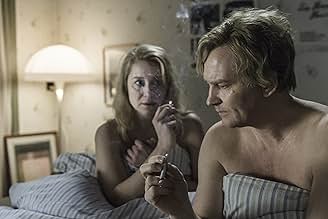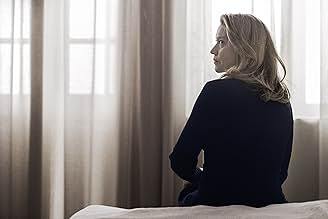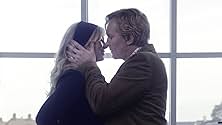IMDb-BEWERTUNG
6,4/10
8516
IHRE BEWERTUNG
Eine Geschichte über den Konflikt zwischen persönlichen Wünschen und der Solidarität und Toleranz in einer dänischen Kommune in den 1970ern.Eine Geschichte über den Konflikt zwischen persönlichen Wünschen und der Solidarität und Toleranz in einer dänischen Kommune in den 1970ern.Eine Geschichte über den Konflikt zwischen persönlichen Wünschen und der Solidarität und Toleranz in einer dänischen Kommune in den 1970ern.
- Auszeichnungen
- 6 Gewinne & 21 Nominierungen insgesamt
Empfohlene Bewertungen
Thomas Vinterberg performs an experiment / study of the human personality by gathering a gallery of characters (with whom it is difficult to identify yourself personally) and placing them in an extreme situation of coexistence. The supposed pragmatism or cold- blooded of Nordic people to face problems, here blows up. The ability of the director makes the viewer to take part inadvertently in the plot of the film as one more character of his work. Anna, TV presenter. and Erik professor of architecture form together with his teenage daughter an apparently happy family with no more complications than "the problem" of managing the use of a big inherited house. So great the house that they decide to share the use. The new experience begins with great joy but ends up in a dramatic way by crushing the promoter of the idea of sharing the house. It is interesting to observe the behavior of the teenage daughter through the story and also trying to understand how difficult it can be for a teacher accustomed himself to dominate students and situations from a position of strength to have to give up the domain of his house and almost his way of life for the general interest of a group composed by people whose specific weight is equal to nothing; the parasite that barely contribute, the "bums" that do not compromise themselves in anything, a liberal couple contributing to the experiment with a sick child who possibly might have been better brought up in the privacy of a normal home, etc. In summary, this film is full of teachings and is a great exercise in the expression of different behaviors, through the coexistence of a group of people with whom (out of the movie) it would be difficult to establish a friendship and still less to share your life. Finally highlight the great interpretation of the wife versus the weak of Erik's lover. talking of actresses terms, of course. The plot is set in 1970 but this fact is totally irrelevant.
A middle class Danish couple find that they have inherited a rather grand house on the death of Erik's father. It is going to be too big for them and their only daughter and more over too hard to finance and so Anna suggests they invite a few others to live with them and for a 'Kollektivet' or as we would call it a commune.
They waste little to no time in getting an assorted array of waifs and not so strays and soon fine that communal living bring challenges and opportunities in equal measure. Not all of them are going to be easy to grasp and the tensions, that go hand in hand with any social experiment, waste no time in pushing their way to the fore.
Now I really liked this, I loved the idea of a commune having spent time in one in the eighties (when they were a bit passé to be honest) and the themes are explored here but also the lives of the main characters are mostly to the fore. This is Anna played brilliantly by Trine Dryholm – 'The Legacy' and her husband Erik (Ulrich Thomsen – 'The Blacklist') and their young daughter who is growing up much too quickly. His is from director Thomas Vinterberg who brought us 'The Hunt' in 2012 and 'The Celebration' in 1998 and I think he has an eye for style but sometimes struggles to engage, but here I think he has melded all parts of the art very well together to bring a very entertaining watch – recommended.
They waste little to no time in getting an assorted array of waifs and not so strays and soon fine that communal living bring challenges and opportunities in equal measure. Not all of them are going to be easy to grasp and the tensions, that go hand in hand with any social experiment, waste no time in pushing their way to the fore.
Now I really liked this, I loved the idea of a commune having spent time in one in the eighties (when they were a bit passé to be honest) and the themes are explored here but also the lives of the main characters are mostly to the fore. This is Anna played brilliantly by Trine Dryholm – 'The Legacy' and her husband Erik (Ulrich Thomsen – 'The Blacklist') and their young daughter who is growing up much too quickly. His is from director Thomas Vinterberg who brought us 'The Hunt' in 2012 and 'The Celebration' in 1998 and I think he has an eye for style but sometimes struggles to engage, but here I think he has melded all parts of the art very well together to bring a very entertaining watch – recommended.
The story is not a good study of characters. All of them are almost caricatures. When the existential problem between Erik and Ana arises, both behaves in a way too much elementary, taking in account the gravity of the situation which is going on. More precisely (1) Erik is absolutely incapable to realise that he is ruining the emotional life and the self respect of the woman with whom he has been married and living in a pleasant way during at least fifteen years. A woman who proved to be generous when she accepted that Emma could live with the community, and who had probably fantasies of living a ménage à trois, along with Erik and Emma, thing that I think reasonable and human, considering what was going on. Erik sticks with Emma as if he hadn't any responsibility with regard to Anna feelings. (2) Anna is incapable to react in time to rescue her dignity which is being hurt by the irresponsible behaviour of Erik. The rest of the characters manifest themselves very poorly with respect to the crisis between Erik an Anna. Except the young Freja, daughter of Erik and Anna which is the only one capable to say that her mother must leave the community and seek for a new life. In short, Erik who is almost a pivot of the whole story, behaves - in the light of existentialist philosophy - as an individual with bad faith. I would add also, on my part, that he is a kind of mediocre individual.
Kollektivet (original title) or The Commune (English title), the new movie from director Thomas Vinterberg (known for Festen - The Celebration - 1998, Submarine - 2010 and Jagten - The Hunt - 2013), one of the founders of the film movement Dogme 95, which seeks to create a more realistic and less commercial cinema, deals with a family in the 70s, formed by the father Erik (played by Ulrich Thomsen, known for Festen - The Celebration - 1998 and Adams æbler - Adam's Apples - 2005), the mother Anna (represented by Trine Dyrholm, known for Festen - The Celebration - 1998 and DeUsynlige - Troubled Water - 2008) and the daughter Freja (played by Martha Hansen). Erik inherits the house of his family after the death of his father, but considering it very large and with high maintenance costs he is willing to sell it. However, his wife convinces him to turn the house into a kind of community, inviting some friends and even interviewing strangers to share the house and to help pay the bills. Living in a group, like a big family, they have dinners, parties and regular meetings so that important matters are made democratically. But the utopia around this experiment begins to be questioned when a love affair shakes the small community.
Kollektivet hits to portray very well the time when the story takes place: the 70s in Copenhagen. The production design, costumes and characters's characterization, expressed by the clothes, hair and costumes, confer credibility and immerse the viewer in the plot. But the film errs for not develop enough the characters that are not part of the central plot. The director should have further explored the group in conflict scenes and the writer could have better elaborated the difficulties of social life that are inherent to a life in a community. As it was written the supporting actors add little to the story and the parallel plot of Freja's journey into adulthood opposed to the reflection of everything that happens within the community deserved to be better developed.
The big highlight is the actress Trine Dyrholm, who received the Silver Bear for Best Actress at the Berlin Film Festival this year for her excellent performance. The most dramatic scenes and the strongest blows that we took in the feature film are starred by her character, Anna, a television news presenter. The actress representation convinces not only because her ability to express emotions in times of joy or in the darkest moments, but by the naturalness of interpretation, which makes the viewer forget that it's just a role play.
Convivial challenges can be overcome? To what extent a community project should override the individual interests? What is more important: the individual or the collective? Life in community is possible? These are some of the questions that The Commune tries to address, but ends up doing superficially. Director Thomas Vinterberg had talent to produce a film with a final result much better than he produced.
Originally posted in: https://vikingbyheart.blogspot.com.br
Kollektivet hits to portray very well the time when the story takes place: the 70s in Copenhagen. The production design, costumes and characters's characterization, expressed by the clothes, hair and costumes, confer credibility and immerse the viewer in the plot. But the film errs for not develop enough the characters that are not part of the central plot. The director should have further explored the group in conflict scenes and the writer could have better elaborated the difficulties of social life that are inherent to a life in a community. As it was written the supporting actors add little to the story and the parallel plot of Freja's journey into adulthood opposed to the reflection of everything that happens within the community deserved to be better developed.
The big highlight is the actress Trine Dyrholm, who received the Silver Bear for Best Actress at the Berlin Film Festival this year for her excellent performance. The most dramatic scenes and the strongest blows that we took in the feature film are starred by her character, Anna, a television news presenter. The actress representation convinces not only because her ability to express emotions in times of joy or in the darkest moments, but by the naturalness of interpretation, which makes the viewer forget that it's just a role play.
Convivial challenges can be overcome? To what extent a community project should override the individual interests? What is more important: the individual or the collective? Life in community is possible? These are some of the questions that The Commune tries to address, but ends up doing superficially. Director Thomas Vinterberg had talent to produce a film with a final result much better than he produced.
Originally posted in: https://vikingbyheart.blogspot.com.br
Less difficult to watch then The Hunt or Festen, Thomas Vinterberg's Kollektivet (The Commune) impresses with great cinematography and how successfully it seems to reconstruct the details of the sixties and seventies fashion in Copenhagen, Denmark. But at the same time, it fails to deliver a truly engaging story. It's an interesting story, it's an exotic story, but the situations presented are so unfamiliar for someone who hasn't even considered living in a commune that it simply makes the plot hard to relate to. The Danish director apparently grew in a commune, but that doesn't mean that the story is autobiographical. However, it is pretty obvious that such a subject couldn't be presented so convincingly by someone without the experience of living in a commune. European movies are more and more something of an alternative cinema treat and this movie is a quite a delight from that perspective. The alternative lifestyle of the protagonists is presented in such detail that it doesn't seem forced or artificial. Most of the characters have strong personalities, but these are kind of ignored, as the pace is too quick to stop for them. Ultimately, what truly sticks out in your memory hours even after watching the movie is a very sad love story. A story about allowing extreme changes to your lifestyle and then having to bear all the consequences, with all the associated happiness and tears. "Maybe this is what people use to do in the Northern parts of Europe, I don't know what to say" was the first reaction of someone in the audience that I overheard at the European Film Festival, after the Bucharest opening screening. I kind of agreed. It is quite difficult to relate to a movie about an extreme leftist commune from Denmark. However, if you like strange stories that show with great talent a historical time and place, then The Commune is something you might fully appreciate. Yes, the action could also take place in a more modern setting, as the world is full of communes. However, what really makes this movie watchable is the love invested in recreating the look & feel of a defunct 20th century decade as seen and felt in a Northern Europe capital by a truly talented and hard- working director.
Wusstest du schon
- WissenswertesThe film is based on Thomas Vinterberg's play of the same name, which is inspired by his colourful childhood in an academic commune north of Copenhagen.
- PatzerThe signs on the bus stops were not introduced until the late 80's or 90's.
Top-Auswahl
Melde dich zum Bewerten an und greife auf die Watchlist für personalisierte Empfehlungen zu.
- How long is The Commune?Powered by Alexa
Details
- Erscheinungsdatum
- Herkunftsländer
- Offizielle Standorte
- Sprache
- Auch bekannt als
- The Commune
- Drehorte
- Hellerup, Sjælland, Dänemark(location)
- Produktionsfirmen
- Weitere beteiligte Unternehmen bei IMDbPro anzeigen
Box Office
- Bruttoertrag in den USA und Kanada
- 38.737 $
- Eröffnungswochenende in den USA und in Kanada
- 9.249 $
- 21. Mai 2017
- Weltweiter Bruttoertrag
- 4.410.339 $
- Laufzeit1 Stunde 51 Minuten
- Farbe
- Sound-Mix
- Seitenverhältnis
- 2.35 : 1
Zu dieser Seite beitragen
Bearbeitung vorschlagen oder fehlenden Inhalt hinzufügen






























